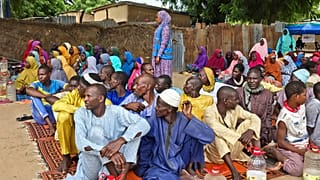polio
For nearly four decades, there’s been a global effort to eradicate polio, a highly contagious viral disease that primarily affects young children.
But experts say challenges with vaccination programmes on the ground have led to the ongoing transmission of the wild polio virus – notably in Pakistan and Afghanistan.
Officials tout the successes – three billion children vaccinated, an estimated 20 million people who would have been paralysed spared – while acknowledging challenges in Pakistan and Afghanistan.
WHO Director of Polio Eradication Dr Jamal Ahmed defended progress in those two countries, citing workers’ tailored response in resistant pockets.
Dr Tom Frieden, a member of an independent monitoring board for polio eradication, said programmes in those two countries face many challenges.
"Whether they are security challenges or the lack of any healthcare or social services in some communities that have had it for a long time, or the polio programme itself that has gone through some ups and downs and doesn't necessarily have the kind of tight management needed,” he said.
Critics of programmes led by the World Health Organization and its partners in the Global Polio Eradication Initiative, say they have been derailed by mismanagement and what insiders describe as blind allegiance to an outdated strategy and a problematic oral vaccine
While the oral vaccine is safe and effective, it contains a live virus which, in very rare instances, can paralyse a child.
In even rarer cases, the virus can mutate into a form capable of starting outbreaks among unimmunised people where vaccination rates are low.
Except for Afghanistan and Pakistan, most polio cases worldwide are linked to the vaccine, several hundred cases have been reported annually since 2021, with at least 98 this year.
“In Africa, we have vaccine-derived polio that has really reverted to be more like what we call wild type polio and is causing the same paralysis that other polio causes,” said Dr Frieden.
Most public health experts agree the oral vaccine should be pulled as soon as possible.
Frieden said that the good news is that there is a safer injectable vaccine which does not use a live virus and does not come with the risks of the oral vaccine.
“That is now being rolled out across Africa and has less risk of resulting in vaccine-derived polio,” he said.
“If vaccination programmes are done with high quality, you don't get vaccine-derived polio, it's only when the vaccines aren't well used, when they have such a low coverage, that that can happen.”
Polio eradication is one of the world’s most expensive public health initiatives and there are fears that funding shortfalls could see a resurgence in some countries.













Go to video
Twin health crises: Marburg and cholera challenge Africa’s health system
Go to video
Europe is not doing enough to detect HIV, hepatitis, health authorities warn
01:03
Outbreak of viral hemorrhagic fever claims 6 lives in Ethiopia: WHO responds
02:09
Gabon researchers test promising single-dose malaria treatment
01:31
South Africa starts clinical trials on first locally developed oral cholera vaccine
Go to video
WHO issues urgent financial guidance amid aid drop